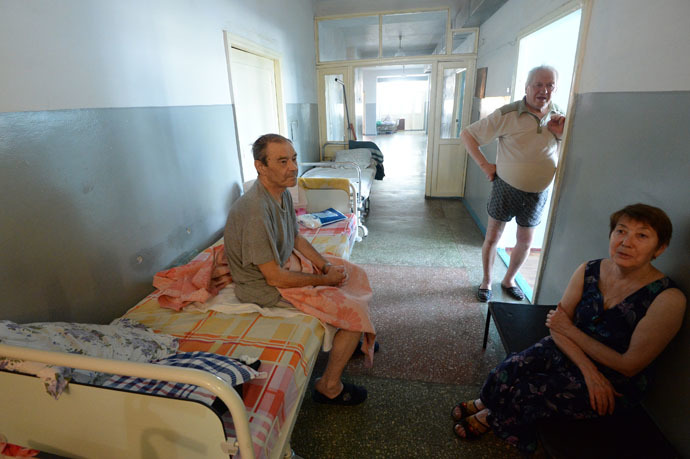Patients ‘dying of hunger & cold’: WHO raises alarm over healthcare in Ukraine
The lack of doctors and medicines in the eastern Ukrainian conflict zone is putting lives at risk says a new World Health Organization report, which describes the situation on the ground as “not just a humanitarian crisis.”
“No child has been vaccinated in the areas affected by conflict since September 2014, sending polio vaccine coverage down to less than 30-40 percent,” the WHO report reads.
Fears of Ukraine becoming increasingly vulnerable to preventable diseases are becoming ever more real.
READ MORE: Polio epidemic fears as Ukraine’s vaccine stockpiles dry up
The report comes up with more “daunting” statistics in the section titled “Not just a humanitarian crisis,” where it speaks about the first casualties of the botched healthcare system.
“About 40 patients in a mental health institution have reportedly died from hunger, cold and lack of care,” it says.
The WHO argues 60 villages situated in between the front lines of the Kiev troops and the rebels have been left with no medical personnel at all. It also estimates the city of Lugansk has only a third of the doctors and nurses that used to work there.

“Universal health care exists only on paper,” says Dorit Nitzan, the WHO representative for Ukraine. “People have to pay for a large portion of health services, procure their own medicines and there are no set prices for these essentials.”
READ MORE: Tough treatment: Doctors in war-torn Ukraine
The WHO is trying to assist with mobile emergency units, consisting of one doctor, two nurses and a logistician. The units are dealing primarily with internally displaced people, assessing their health and trying to refer them to any medical services that still exist.
#ДокторЛиза увозит еще одну партию больных детей из #Донецк. 16 часов в пути до Москвы. Не словом, а делом помогает! pic.twitter.com/n4jrrfTkzG
— Roman Kosarev (@Kosarev_RT) December 10, 2014
The Russian charity, Fair Aid, run by a renowned Russian
philanthropist, Elizaveta Glinka - better known as just Doctor
Liza – has meanwhile been regularly transporting children with
serious health problems to medical institutions in Moscow.
She has already helped 36 children from Donetsk get treatment in
the Russian capital. And she was accompanying another group of 13
kids - 4 of them born this year, and others aged from 4 to 12
years – on Wednesday.
“All the children I bring to Moscow are seriously ill - some of them have epilepsy with frequent seizures, some have congenital heart disorders,” Glinka told RT’s Roman Kosarev, as the bus was about to set off from Donetsk.
Ivan Kravchenko, father of 3-year-old Ilya, who has heart disease, said Fair Aid was their last hope.
“Surgeons are nowhere to be found – they’ve all left,” Ivan told RIA Novosti. “The fund found out about us and offered assistance...” Everything, from the trip to Moscow to the surgery itself, will be free of charge for Ilya.
The main challenge is safely passing the Ukrainian section of the road from Donetsk to Konstantinovka on the border with Russia.
“There are checkpoints, and the road is completely ruined by tanks,” Elizaveta Glinka said. “We'll have to hold our children tight - as you can see, we don't have the prams we need - so we just have to draw them close to us and hold them with our hands.”












